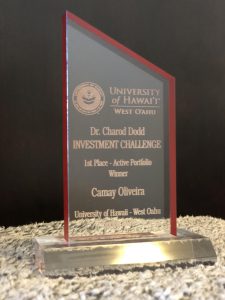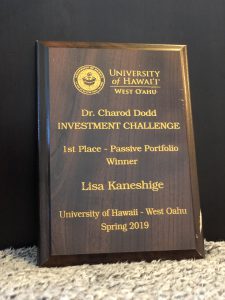
Dr. Charod Dodd with last semesterʻs investment challenge winners, Camay Oliveira (left) and Lisa Kaneshige.
Both business and non-business majors are enhancing their financial literacy thanks to the “Dr. Charod Dodd Investment Challenge,” named after UH West Oʻahu lecturer Charod Dodd, Ph.D., who has incorporated the challenge in his BUSA/FIN (Business Administration/Finance) 326 Investments course this semester.
The investments course covers forms of investments, such as corporate and municipal bonds, common stock, preferred stock, REITs, and retirement accounts. Dodd and his students analyze the risk and return associated with each of these investments. They discuss portfolio valuation, fundamental, technical, behavioral, economic and political risk associated with valuing securities.
In real time, they explore causes of market volatility observed by indexes and the stock price of individual companies. They also discuss investment theories, historical trends, as well as real time Fortune 500 company decisions as covered in the Wall Street Journal (WSJ). Particularly, they analyze the effects on their market price due to executive decisions, fundamentals and economic conditions. The course also covers brokerage functions, stock exchanges and historical data, with a focus on the degree of risk and expected return.
As part of the investment challenge, students engage in the practical application of managing two $100,000 portfolios. For the first portfolio, students are instructed to apply a buy and hold method of investing. Each student chooses five companies and exhaust the $100,000 between the five companies. For the second portfolio, students are instructed to make as many transactions as they would like throughout the semester.
At the end of the semester, they will compare the returns and theories used to set up and manage each portfolio. They will also analyze the risk and return, market conditions and valuations in real time based on the decisions each student is making.
After last semesterʻs challenge, multiple students outperformed market returns. At the beginning of the semester, students relied on use of personal beliefs, rhetoric they heard and behavioral ideas to drive their investment decisions. By the end of the semester, students were applying the strategies discussed throughout the semester. Last semester, Dodd included awards for the first place winners of the active and passive portfolios. This semester, Dodd plans to add small scholarships for the winners of each portfolio.


“I enjoy teaching this course and watching the growth in financial literacy displayed by each student,” Dodd said. “I have been able to grow the application and engagement in this course by including WSJ articles and the discussion of current market events. I have also introduced students to research in the field of finance, particularly in investment finance research.”
Dodd has years of experience in the finance industry, has served as a finance professor for over 10 years and published in the areas of real estate finance, behavioral finance, investments and corporate finance.
